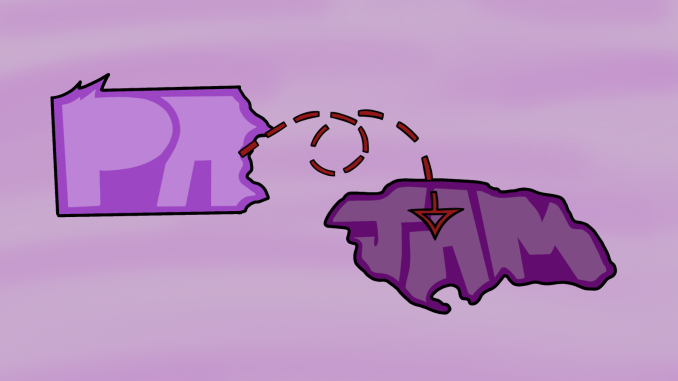
In June 2021, I traveled to Jamaica for the first time since the pandemic started. It was my first time going to Jamaica with my dad, and it was a trip we had planned prior to the pandemic.
I’ve traveled to Jamaica on multiple occasions with my mom, who grew up in the St. Catherine parish, which is near Kingston, the country’s capital, where she went to school. My dad grew up in the Westmoreland parish, located on the other side of the island.
The trip was especially important to me because I got to see Jamaica from my father’s perspective.
Prior to this visit I always stayed with my maternal grandparents in St. Catherine because my parents are divorced, and I traveled with them separately. Even though I had traveled to Jamaica before, I never felt truly connected to my roots there. However, this recent trip made me realize that Jamaica is a part of my identity.
My father had arrived in Jamaica about a month before I did. When I got in the car from the airport, he began excitedly telling me facts about the area he grew up in.
On one of the first nights, I went to a party to celebrate the life of a family friend’s uncle. My father explained that when someone passes away, the entire neighborhood comes out to drink, dance and socialize as a way to commemorate the person who passed.
The entire neighborhood was present. The elders sat under tents, chatting. The younger adults stood around outside lightly dancing to the music with drinks in their hands, while their children ran around playing with each other.
The elders eventually turned in for the night, and more young people began showing up. There was one small shack in the middle of the outing with laser lights coming through the windows. I got a quick glimpse of girls in the middle “wineing”, a dance often paired with dancehall music, while guys stood watching them.
I loved that instead of mourning someone in sadness, the community could celebrate them.
That was my first example of a local community coming out to be together, and while I mostly observed, I felt comfortable, not foreign.
I was in Jamaica for two weeks but never stayed in the same place for long. My dad and I drove all throughout Jamaica, almost circling the entire coast.
While in Westmoreland, he showed me the factory town where he grew up. My dad never complained once about his childhood in his nice, but somewhat small home that seven people shared.
Compared to the life I had in the United States, my dad’s childhood would not be suitable for me. However, my dad talked about all the privileges he had compared to his friends at the time. He lived a comfortable life in Jamaica.
My father explained that there was a class system based on the level you worked in the factory. Because my grandfather worked security, he was given “middle-class” housing, which was a lot better off than other employees.
Because I had only seen my mother’s home, I could only identify with the Jamaica that she had known. My mom experienced more city life than my father. My mom’s family had lots of farmland, and were generally well off. Additionally, my mother was not raised in a fully Jamaican household, as her mother is from Guyana.
When I visited her home, I was a child, which limited my ability to explore and speak to many people outside of family and friends. This time, I had plenty of freedom.
Additionally, this was only one half of my Jamaican identity. I had an entire family and culture on my dad’s side that I didn’t know much about other than through stories from my paternal family in the States.
I felt like I’d found a missing piece of my identity by seeing my dad’s childhood home, which answered my questions about his life that I had only imagined previously.
While I only stayed in Jamaica for two weeks, I felt fully embraced by the culture and the people there. For years, I proudly claimed my Jamaican roots, but internally never felt truly connected to them because I had only grown up and known life in the U.S.
Being fully accepted by the people I met ultimately gave me confidence in my Jamaican-American identity that I did not have before this trip. When I go back to Jamaica, I won’t hesitate to learn more about my family history and explore the island on my own accord.
Meeting my dad’s family and friends and experiencing his side of Jamaica made me realize that I could call this place my home.
Next time I go back, I won’t say I’m going on vacation, I will say that I am going back home.


Be the first to comment